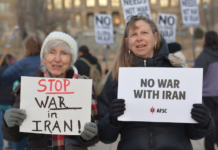
Report by Pacific Media Centre – Kiribati Independent editor Taberannang Korauaba in Auckland analyses the fallout from the “climate change refugee” controversy. He was at the Waitakere District Court hearing in Auckland.
“I have often said that this is the moral challenge because it calls on answers which are unprecedented – never written and never heard of, so this calls for outside-the-box solutions.” – President Anote Tong, 2014
The deportation of Ioane Teitiota by the John Key government signals a strong message to the low-lying islands in the Pacific that they are not disappearing because their people are still “alive”.
The New Zealand government’s response isn’t surprising given its admission a few weeks before the general election it won last year, it would not accept climate change refugees from the Pacific.
Prime Minister Key has missed a very important opportunity as the eyes of the world have been on New Zealand since 2013 when the courts rejected the climate change refugee case.
They are eager to learn – from a country calling itself a Pacific nation – how it is going to respond to the issue of a climate change.
The courts could not do it because they don’t have the power to grant Teitiota status as a climate change refugee.
Arresting Ioane Teitiota and deporting him to his country of birth are legal because he has breached the law. Sending back his three New Zealand-born children to Kiribati with him and wife is also legal because they have no NZ citizenship.
Growing concern
On the face of this, it is a clear denial of climate change science and rejection of President Anote Tong’s growing concern about the future of his country by Prime Minister Key.
Was Ioane Teitiota in the wrong place at the wrong time?
In a global context, New Zealand is doing very badly in terms of climate change policies – along with Australia – despite the islands’ respect for these two big brother nations, hoping that they will not turn their backs on them.
The Pacific Islands Forum leaders meeting in Papua New Guinea earlier this month showing that the New Zealand and Australian prime ministers are living on a different planet
The rejection of a dire situation in Kiribati by John Key is a slap in the face of Kiribati’s President Tong, who has tirelessly spent nearly 10 years campaigning and promoting the profile of the climate change issue to the international community.
But New Zealand has demonstrated to the Pacific Islands and the world that the notion of a “disappearing nation” should not be part of the media climate change narrative.
I was at the Waitakere District Court hearing on Monday listening to the arguments of both lawyers and questions from judge Stan Thorburn.
Having considered evidence from both lawyers, Judge Thorburn firmly reminded that the court it was not a forum to argue climate change after lawyer Michael Kidd, who represented Teitiota, started making some political statement downgrading the government’s compassionate approach to the Syrian refugee crisis.
The judge said that while he sympathised with the Kiribati people during the difficult time they had gone through, referring to the impacts of climate change and rising sea levels, he could not entertain such debate in his courtroom.
As the judge said: “I wish I could help, but I have no power and jurisdiction to allow Ioane to be released on bail.”
‘People power’
When supporters of Teitiota attempted to put pressure on the government, using what we call “people power”, it went unnoticed because they are fighting in the wrong battlefield at the wrong time – the New Zealand government had already made up its mind on this case.
The Immigration Department informed the court that the family had been booked on a flight today. The judge issued a warrant of commitment to be effective on September 28, giving his wife and three children a few more days to say goodbye to a country they once called home.
They will leave for Kiribati next Monday.
Not only did they ask for the delay from Immigration, but the judge provided them with the opportunity to seek the minister’s intervention which failed, and to get ready for deportation.
Kiribati reactions
I-Kiribati people, like everyone else, don’t want to hear bad things said about their country, land means a lot to the people.
When the people first learned of Teitiota’s case in 2013, they were curious about what this man was doing. Some described him as a “traitor” and a troublemaker, lacking in national pride and bringing shame on his country.
The controversy was on the news on local radio and newspapers. People felt humiliated when they heard about Teitiota’s efforts to stay in New Zealand.
A number of people wrote to local newspapers, calling on him to return to Kiribati to go out fishing and cutting copra with them rather than staying in New Zealand to argue his case as a refugee.
Despite being aware of public hatred against them, Ioane and his wife, Erika, never gave up and continues their struggle for their three children.
As Erika joked to me outside Waitakere court:
“Ko nang noriia taan kan tiku i Nutiran bwa e nang roko aia bong ngkana a roko i Kiribati” (People on the islands won’t be receptive to us because of what we have done).
Overstayer view
Erika truly reflected the kind of feelings from the people of Kiribati towards her husband’s actions.
A Kiribati climate change campaigner wasn’t convinced this was about the environmental issue and posted her anger on her Facebook page. She wrote:
“I don’t want to hear negative stories about Kiribati, the man and the family brought shame to our country. They broke the law, they are overstaying and now they want to be granted refugee status.
I don’t want to read this news item [attached to her message was a NZ news story on John Key’s response to Ioane Teitiota]. Let me remind our people broad to ensure that the follow the law and not become overstayers. We are embarrassed.”
Following her harsh posts, a number of Kiribati people replied to her expressing their support and sympathy for Ioane and his family. She later took down her post and apologised for the hurt she may have caused the children.
The differing opinions between those on the islands and those in New Zealand are obvious for a few reasons.
Those in New Zealand support the man’s three children right to be allowed to stay in the country because they know the environment is going to be tough for them, let alone facing frequent flooding and high tides, water problems, disease, coastal erosion and the lands mainly South Tarawa and Betio.
Both places are crowded.
Those in Kiribati have a strong attachment to their country and many pretend that their country is doing fairly well despite scientific consensus and evidence on the ground that they are in real danger.
Media responses
Focusing on the debate about whether Teitiota is climate change refugee or overstayer, there have been mixed reactions from the news media in New Zealand with many remaining objective with their coverage and approach, and not getting too involved and sensational.
But in a broader climate change coverage sense, several news media, including New Zealand, have already been too involved and gone too close to what the President of Kiribati has publicly announced.
Teitiota’s case may have born out of that sensational storytelling narrative.
The New Zealand news media need to ensure that they challenge what leaders say about climate change, to scrutinise every climate change policy they undertake and to question other NGOs and members of the public what we are doing about climate change.
Teitiota and his lawyer were driven and inspired by what they have heard, read and saw on the news about Kiribati.
Ioane Teitiota was in New Zealand in 2007 and didn’t speak English well then. He has no formal education so the chances of him learning about science from science books are limited.
Teitiota also began his case in 2010 at the time when climate change campaign had become the biggest issue ever with the media strongly focused on Kiribati’s future.
Media coverage of Kiribati’s future in light of climate change peaked in 2008, a year before COP15 in Copenhagen in 2009.
Add to this is the future of his three New Zealand-born children; he wanted them to have brighter prospects here like every migrant.
He personally has no difficulty going back to Kiribati because he worked here and he can cope with life on the islands.
What next?
1. There is, of course, a psychological effect of this issue on Ioane, his wife and three New Zealand-born children. The judge was right when he extended their stay for another week to help them prepare rather than be forced to leave today.
They will require professional counselling support here and in Kiribati. I doubt whether this service is available in the island nation.
2. The media in New Zealand and abroad need to do more to find out what the Kiribati government is doing on the ground, it see for themselves what has been done – look at every project, policy, statement to ensure whether they are consistent with what the President has said.
At the same time, the media also need to scrutinise the New Zealand government and make it accountable for its actions on climate change.
3. The New Zealand government misses an opportunity to tell the world that the time to act is right now by accepting Ioane and his family on humanitarian grounds – forget about the definition of climate change refugee. We all know that New Zealand is contributing less on the global scale, but in terms of helping the islands find a solution, it is doing very badly.
As President Tong has repeatedly told the world, he is preparing his people to migrate with dignity. This means he’s only talking about a small portion of the population, it does not include people living on the outer islands who have no education.
While President Tong keeps reminding the world that his country is “disappearing”. The Teitiota case may be seen as a test about New Zealand’s attitude about climate change.
Prime Minister John Key’s government says Teitiota is not a climate change refugee, he’s an overstayer. His government has refused to intervene.
Goodbye Ioane Teitiota – and welcome back to your disappearing nation.
Video top: Ioane Teitiota’s wife Erika and their youngest child at the petition meeting on Monday.













































